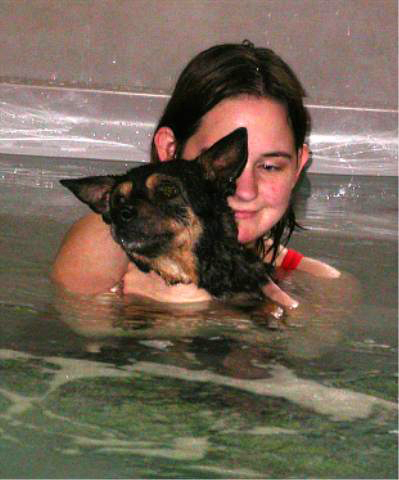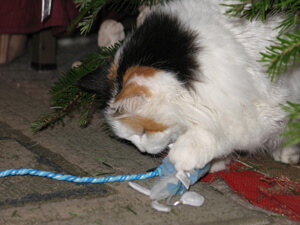We love our pets – they bring us joy, companionship, laughter and… sometimes frustration. And they give us unconditional love. In return, we care for them and love them back as best we can.

But we hate the thought of our pets becoming “seniors” – just as much if not more than we hate to think of ourselves as seniors! So it’s only natural that we hesitate to bring our pets in more often than the usual annual exam.
At the clinic, we frequently hear “My 8 year old dog seems perfectly healthy. He just has some typical old age stuff like trouble getting up from lying down. Do I really need to bring him in?”
If you were in pain and having trouble getting up, wouldn’t you go to the doctor to see if you could get something to relieve the pain? And are you sure that it is just “typical old age stuff”? Better to get it checked out and get some suggestions from Dr. Frank to keep your dog or cat comfortable and pain-free for as long as possible.
Keep in mind that our pets, particularly cats, are very good at hiding any signs of illness, it is their survival instinct. By the time you are seeing symptoms, the illness or disease has typically been progressing for some time.
Q: “So how often should I bring my 10 year old cat in for an exam?”
Remember, your pets age 5-7 years faster than we do. So an annual exam is the equivalent of you going to the doctor every 5-7 years. A lot can happen in 7 years! Dr. Frank recommends an exam every six months starting at age 7 for dogs and starting at age 10 for cats. This provides an opportunity for Dr. Frank to see changes that we don’t notice on a daily basis. It also allows an informative discussion twice a year about ways to prevent common age-related illnesses or diseases.

Q: “What can the Doctor see that I can’t see?”
At each exam Dr. Frank will do a thorough check of your pet’s eyes, ears, teeth, skin and joints. He may recommend blood work to monitor organ function such as the kidneys, liver or thyroid glands, as well as answer any questions you may have. Dr. Frank will also palpate the abdomen, feeling for abnormalities such as enlarged organs, lymph nodes or masses.
Dr. Frank’s experience and expertise at feeling and seeing abnormalities or changes that we may not even notice is invaluable. Sometimes we don’t notice because it has been such a gradual change. Sometimes changes are within an internal organ that requires a vet’s training and skill to detect.
Q: “Is there really anything that can be done to prevent illness?”
This is the reason why Dr. Frank chose the name of our clinic to be “Wellness Center” rather than veterinary hospital. Our goal is to promote wellness, not just diagnose and treat illness. Preventive care such as diet, supplements, exercise and regular wellness exams are the best way to keep our pets healthy for as long as possible.
There is no blanket prescription for every pet, as each is unique. But Dr. Frank can discuss the best wellness plan for your cat or dog, helping you to keep your beloved pet healthy and happy for as long as possible.
